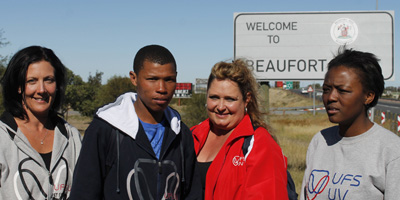About 5 km short of Wortelfontein Guestfarm in the Northern Cape, Rachel Swart is sitting on the porch of her peasant house when four people come walking down the dirt road.
Guests on foot are not a regular sight in this region, because you must understand, Wortelfontein is situated where Hanover lies far behind you and Richmond is still a very long way off.
|
 |
The four people on the dirt road are the hikers from the University of the Free State (UFS) on their way to Cape Town (on foot) to create awareness for food-insecure students at the UFS.
Adele van Aswegen, Ronel Warner, Ntokozo Nkabinde and Nico Piedt are already on the road for more than two weeks as part of the No Student Hungry bursary’s (NSH bursary) fundraising efforts. The bursary provides assistance to students at the UFS who often do not have enough to eat.
On day 12 of their walk, the plan was that our hikers would stay at Wortelfontein Guestfarm, but unfortunately they took the wrong turnoff. It is precisely at this point where they met Rachel.
“I will show you where Wortelfontein lies. One can easily get lost here,” says Rachel decidedly and points to the straight main road. She ties her baby skilfully behind her back with a towel and tackles the next 5 km together with our hikers.
“It is this kind of support and encouragement that keep us on the road,” says Adel.
Everywhere along the road people are stunned and concerned about the four’s trip and immediately offer their help.
Near Trompsburg, an elderly couple who just heard about the hikers at church, stop next to them and offer them a lift to the next town. They are thankful for the gesture, but have to decline the offer.
Between Trompsburg and Springfontein, Doug offers to take them to Springfontein. Once again they decline the offer.
There was also the uncle who wanted to buy them cool drink and the road workers who cheered them on.
In Colesberg a group of children asked worriedly: “Aren’t auntie and them hungry yet?”
These boots are made for walking ... to Cape Town (Article of 02 May 2014)
Daily updates:
(You can also follow us on @UFSweb for daily tweets)
Day 21: 21 May 2014
15:09
42 km
Leeu Gamka Hotel
Day 20: 20 May 2014
13:39
20 km
Alida, Springfontein
Day 19: 19 May 2014
12:31
27.6 km
Teri Moja Game Lodge
Day 18: 18 May 2014
First rest day
Nagenoeg Guesthouse, Beaufort West
Day 17: 17 May 2014
19:30
62.3 km
Nagenoeg Guesthouse, Beaufort West
Day 16: 16 May 2014
13:00
14 km
Taaibochfontein
Day 15: 15 May 2014
16:03
32 km
Travalia, Three Sisters
Day 14: 14 May 2014
18:33
43 km
Joalani Guest Farm
Day 13: 13 May 2014
17:30
33 km
Die Rondawels
Day 12: 12 May 2014
16:49
40 km
Aandrus B&B in Richmond
Day 11: 11 May 2014
39 km
Wortelfontein (Magdel and Christiaan)
Day 10: 10 May 2014
15:44
34 km
Hanover Lodge
Day 9: 09 May 2014
40.8 km
Camping between Colesberg and Hanover
Day 8: 08 May 2014
15:25
33.7 km
Colesberg, The Lighthouse Guesthouse
Day 7: 07 May 2014
15:08
23 km
Orange River Lodge
Day 6: 06 May 2014
15:57
51.06 km
Gariep Forever Resort
Day 5: 05 May 2014
12:18
28 km
Rondefontein
Day 4: 04 May 2014
15:27
35 km
Trompsburg: Fox Den
Day 3: 03 May 2014
17:30
46.74 km
Edenburg Country Lodge (Hotel)
Day 2: 02 May 2014
11:44 am
15.3 km
Tom's Place
Day 1: 01 May 2014
32 km
Leeuwberg